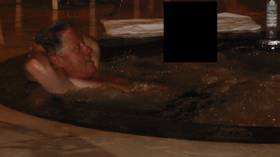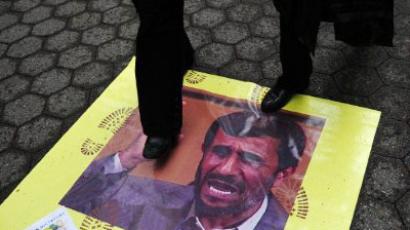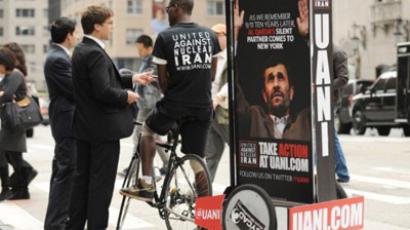IAEA study as pretext for war on Iran
In its most critical report yet on the country, the International Atomic Energy Agency says Iran might be working on developing nuclear weapons.
Its findings were widely-expected and come days after Israel bluntly declared that military action against Iran is getting closer, raising fears the report could be a pretext for an attack.In response to the IAEA report, Iran's President Ahmadinejad said on Wednesday that his country "will not budge an iota" from its nuclear path.It has emerged that France intends to arrange a meeting of the UN Security Council to discuss the IAEA report on Iran’s nuclear program.China, one of the Security Council's veto-holding members, says it is studying the report but refrained from making any comments on the allegations against Tehran.In fact, the UN nuclear watchdog has found no smoking gun, but has succeeded nonetheless in hyping up fears that Iran is continuing its research on nuclear weapons.According to America’s Fox News, “It doesn’t say Iran is building a [nuclear] weapon, but it says it [Iran] is collecting all the information it would need to do so. It has a lot of technology.”The IAEA claims to have Iranian computer models of nuclear warheads which the watchdog views as a possible indication that Iran is planning to build an atomic bomb. Among other evidence there is a satellite image of a steel container that might be used to secretly test the high explosives needed to trigger a nuclear weapon.But some, like former CIA officer Philip Giraldi, have grave doubts about the value of the IAEA report.“I would be very skeptical about this report that is coming out from the International Atomic Energy Agency, because the IAEA doesn’t really have any intelligence capabilities of its own. It is relying on reports that are coming from other people. I would rather suspect these reports are coming from the US and Israel,” says Giraldi.The precedent of US intelligence presenting false evidence to build a case for the war in Iraq raises alarm bells as to the accuracy of the atomic agency’s latest report on Iran. “You may have a piece of evidence of some kind, but that piece of evidence is subject to your interpretation,” Giraldi says. “When they saw aerial photographs in Iraq showing certain things, they interpreted those photographs to mean something which was not correct.”Back in 2003, the US was adamant its evidence on Iraq’s weapons of mass destruction and terrorist capability was as solid as could be. Satellite images of a base where Saddam Hussein was believed to train al-Qaeda terrorists, evidence of mobile labs for biological weapons, aluminium tubes presented as components of centrifuges to enrich uranium – all of the above proved to be a hoax. And yet, it was enough to start a war that would last eight plus years and kill more than a 100,000 civilians – according to America’s own rather moderate calculations.“Israel is considering military action to take out Iran’s nuclear facilities pre-emptively,” Fox News announced in a recent broadcast.The question many now ask is: could the UN’s atomic watchdog report serve as a justification to start a war with Iran? Security experts say the consequences of such action would be catastrophic. Journalist Barbara Slavin, a former senior diplomatic reporter for USA Today, told RT: “We would most likely see new kinds of attacks, probably on Israel from Hezbollah or other groups, and we would see attacks on American troops perhaps in Iraq and Afghanistan, even more than we have seen so far.“Iran could retaliate in conventional terms. It could attack Saudi Arabian oil fields if you really want to see a crisis in the international economy.”Despite tough rhetoric coming from both Israel and the US, many agree that Washington and Tel-Aviv are most likely to use the report as political leverage to try and isolate Iran, and possibly to put a dent in its flourishing economic relations with China.No-one in the international community, including Russia and China, wants Iran to have nuclear weapons. But what they fear is a drastic unilateral action by Israel with the backing of the United States that could set the region on fire at a time when it is as unstable as it gets. Millions of lives could be in danger if policymakers in Washington or Tel Aviv decide to jump the gun and start a war on grounds which are far from being transparent.














